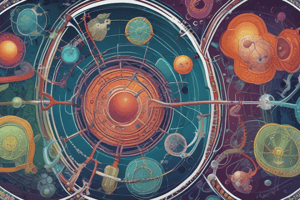Podcast
Questions and Answers
What are stimulating proteins?
What are stimulating proteins?
- Encoded by suppressor genes
- Proteins that inhibit cell cycles
- Encoded by proto-oncogene genes (correct)
- Proteins that induce apoptosis
What are inhibitory proteins?
What are inhibitory proteins?
- Proteins that stimulate cell cycles
- Encoded by suppressor genes (correct)
- Encoded by proto-oncogene genes
- Proteins that enhance DNA replication
How do CDKs become active in cells?
How do CDKs become active in cells?
When they are bound to other proteins called cyclins.
What happens to the concentration of cyclin in the cell throughout the phases of the cycle?
What happens to the concentration of cyclin in the cell throughout the phases of the cycle?
What are cell cycle regulators?
What are cell cycle regulators?
What is the result of improper cell regulation?
What is the result of improper cell regulation?
What are growth factors?
What are growth factors?
What is p53 and its purpose?
What is p53 and its purpose?
What are cyclin-dependent kinases (CDKs)?
What are cyclin-dependent kinases (CDKs)?
How is anaphase-promoting complex/cyclosome (APC/C) activated?
How is anaphase-promoting complex/cyclosome (APC/C) activated?
How does active APC/C stimulate anaphase?
How does active APC/C stimulate anaphase?
What kind of proteins inhibit the APC/C?
What kind of proteins inhibit the APC/C?
CDK-cyclin complexes signal the cell to duplicate its DNA.
CDK-cyclin complexes signal the cell to duplicate its DNA.
Breaks in the two DNA strands during replication activate what protein?
Breaks in the two DNA strands during replication activate what protein?
What is Breast Cancer 1 (BRCA1)?
What is Breast Cancer 1 (BRCA1)?
What mutations are involved in the development of leukemia and lymphomas?
What mutations are involved in the development of leukemia and lymphomas?
What mutations are involved in the development of breast and ovarian cancers?
What mutations are involved in the development of breast and ovarian cancers?
What is the function of retinoblastoma protein (Rb)?
What is the function of retinoblastoma protein (Rb)?
Mutations that inactivate the tumor suppressor functions of p53 and Rb may lead to cancer or tumor development.
Mutations that inactivate the tumor suppressor functions of p53 and Rb may lead to cancer or tumor development.
What are genes that encode p53 and Rb called?
What are genes that encode p53 and Rb called?
If damage to DNA is excessive and cannot be fixed, what happens to the cell?
If damage to DNA is excessive and cannot be fixed, what happens to the cell?
What are kinases?
What are kinases?
Flashcards are hidden until you start studying
Study Notes
Cell Cycle Regulators
- Stimulating proteins are encoded by proto-oncogene genes and promote cell growth and division.
- Inhibitory proteins are encoded by tumor suppressor genes, helping to prevent excessive cell proliferation.
Cyclins and CDKs
- Cyclin-dependent kinases (CDKs) require binding to cyclins to become active, facilitating cell cycle progression.
- Cyclin concentrations fluctuate during the cell cycle, rising and falling in correlation with different phases.
Cell Cycle Regulation and Cancer
- Proper cell cycle regulation is critical; any disruption can lead to cancer development.
- Improper regulation includes mutations in ATM and BRCA1 involved in maintaining DNA integrity, with mutations linked to leukemia, lymphomas, breast, and ovarian cancers.
Role of Growth Factors
- Growth factors are small proteins in the bloodstream that signal the rise of G1-phase cyclin concentrations, promoting progression through the cell cycle.
The Role of p53
- The p53 protein plays a vital role in DNA damage response, halting progression to the S phase if DNA is damaged, thereby preventing flawed replication.
- Mutations in p53 can lead to unregulated cell division and tumor formation.
Anaphase and APC/C
- The anaphase-promoting complex/cyclosome (APC/C) is activated during metaphase once all chromosomes are properly attached to the spindle, triggering the onset of anaphase.
- Active APC/C triggers the destruction of cohesion proteins at centromeres, allowing chromatids to separate.
Inhibition of APC/C
- Mitotic arrest deficient (MAD) proteins inhibit APC/C when they fail to attach properly to the mitotic spindle, preventing premature anaphase onset.
Retinoblastoma Protein (Rb)
- The retinoblastoma protein (Rb) prevents cells from entering the S phase in the absence of growth factor signals, acting as a critical checkpoint.
Consequences of DNA Damage
- Breaks in DNA during replication activate the ATM protein, which halts the cell cycle and initiates repair processes.
- If DNA damage is too extensive and irreparable, p53 can lead the cell to undergo apoptosis to prevent the propagation of damaged DNA.
Tumor Suppressor Genes
- Genes encoding p53 and Rb are classified as tumor suppressor genes, essential for regulating cell division and preventing tumor development.
Kinases and Phosphorylation
- Kinases are enzymes that add phosphate groups to proteins, modifying their activity (activation or inhibition) through phosphorylation processes.
Studying That Suits You
Use AI to generate personalized quizzes and flashcards to suit your learning preferences.




